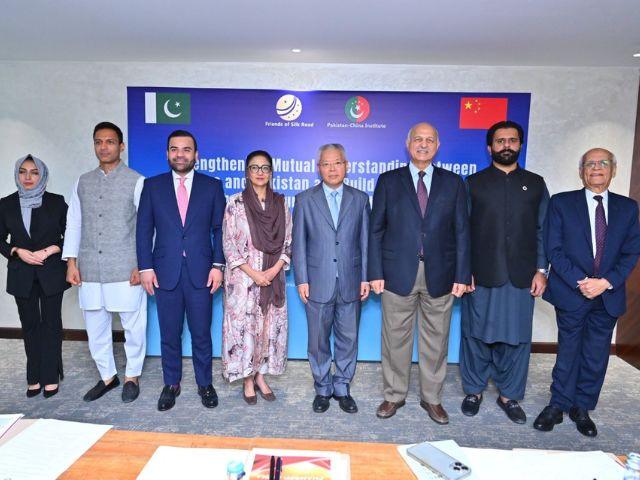The leaders, diplomats, parliamentarians, students and academics gathered in Pakistani-China dialogue organized by the auspices of Pakistan-China (PCI) under the auspices of “Friends of Silk Road”, focused on “ strengthening of mutual understanding between Pakistan and China and the construction of a community with a shared future.
The speakers celebrated the sustainable partnership of `Iron Brothers’, defended a multipolar order based on the Charter of the United Nations and highlighted the Belt and Road initiative of President Xi Jinping (BRI) as a catalyst for peace, prosperity and regional connectivity.
The dialogue was organized by Pakistan-China Institute as well as a high-level delegation of the International Department of the Communist Party (IDCPC) led by the IDCPC spokesperson and information chief, the ambassador Hu Zhaoming.
Mustafa Hyder Sayed, executive director of PCI and moderator of dialogue, opened the procedure by noting that historical friendship on the Silk Road between Pakistan and China has never been transactional or tactical; It is rather rooted in shared history, confidence and a common commitment to raise the wider district. He supervised the dialogue in the context of the broader PCI effort to amplify the voices of Asia and the South world, given the changing global scenario.
Taking an escalation of the rhetoric of the Cold War, he condemned the newly created “PRC influence fund” of the US Congress, which authorizes $ 325 million a year from 2023 to 2027 to counter the malignant influence of the Chinese Communist Party and the Government of the People’s Republic of China in the whole world.
Mustafa called the measure “a return back to the Cold War which diverts the resources of development and dialogue, precisely in contrast to what our region needs”.
Offering the opening speech, Senator Mushahid Hussain Sayed, president of PCI, observed that “the global balance of economic and political power moves from west to east, announcing the Asian century”.
He praised the “peaceful climb of China as a source of force for the development of countries through Asia, Africa and Latin America”, and thanked Beijing for his unwavering support for territorial integrity and the sovereignty of Pakistan, in particular last month in the face of Indian aggression.
Mushahid called “Pakistani talents and Chinese technology as an invincible wall for peace, security and stability in South Asia. Sentenceing the recent Israeli strikes on Iranian territory, the senator qualified the attacks a blatant violation of international law and the Charter of the United Nations, and rejected the stories promoting a “new cold war or the so-called threat to China”.
“Security is preserved by cooperation, not on military blocks or demonizing countries by disinformation,” he said.
Ambassador Hu Zhaoming, spokesperson for the International Department of the Chinese Communist Party (IDCPC), described Pakistan as “ engraved in the deepest heart of the Chinese people ”, “adding”, China and Pakistan are like two sides of the same room – you cannot choose one without the other.
Stressing the evolution of the BRI since 2013, the ambassador Hu noted that more than 150 countries are now participating in the initiative, which “only promotes the internal development of China while promoting global connectivity”. He urged the younger generations to “carry the torch of friendship forward”.
Speaking on behalf of the government of Pakistan, Dr. Shezra Mansab Ali Kharal, Minister of State for Climate Change, argued that the current world order is “visibly fragmenting”, while China systematically advocates multipolarity, non-intervention and equality between states. “The BRI embodies this vision,” she said, “promoting a network of interdependent savings that choose dialogue rather than conflicts.”
Former Foreign Minister Aizaz Ahmad Chaudhry echoes the call for cooperative paradigms during what he called “a period of flow when wars burst and the rules collapse.
“The philosophy of President Xi Jinping of” win-win cooperation and mutual respect “, he said, offers” the most promising foundation for a future world order when dust sets in “.
From a legal point of view, Barrister Aqeel Malik, Minister of State for Law and Justice, stressed that “security and stability are essential” of CPEC’s success.
He defended “soft power bridges” such as the enlarged regional media – including emissions from the Balochi language – to deepen people’s ties to people. Malik also proposed the inclusion of Afghanistan in the CPEC, calling it “a natural extension of the vision of shared future”.
The event was also followed by students and academics from all provinces, representing different universities, media, reflection groups, as well as representatives of Chinese companies working on CPEC projects.
The concrete proposals to jointly promote the “soft power” of Pakistan-China were discussed, as well as certain events and conferences to come in this regard in China.




